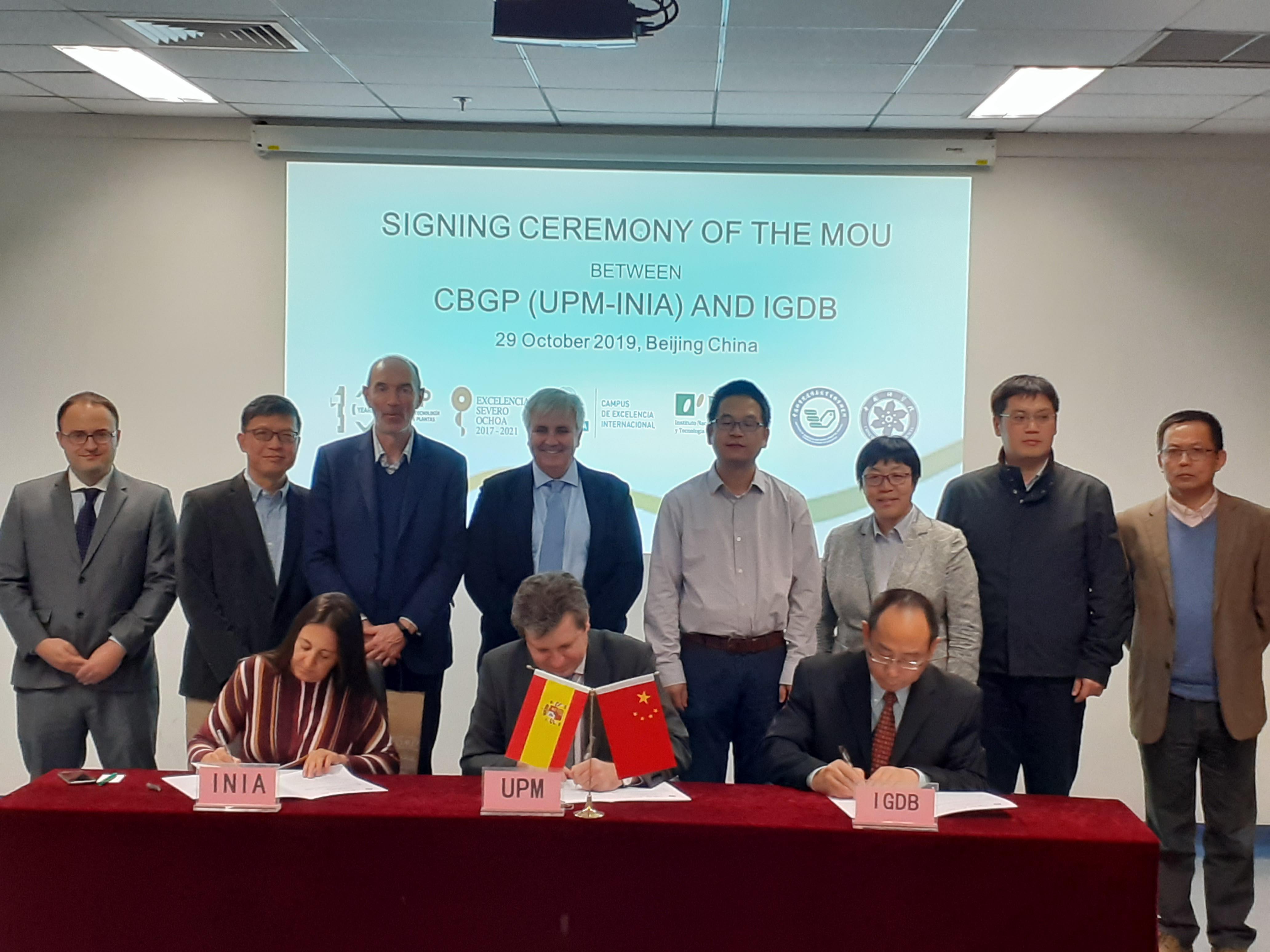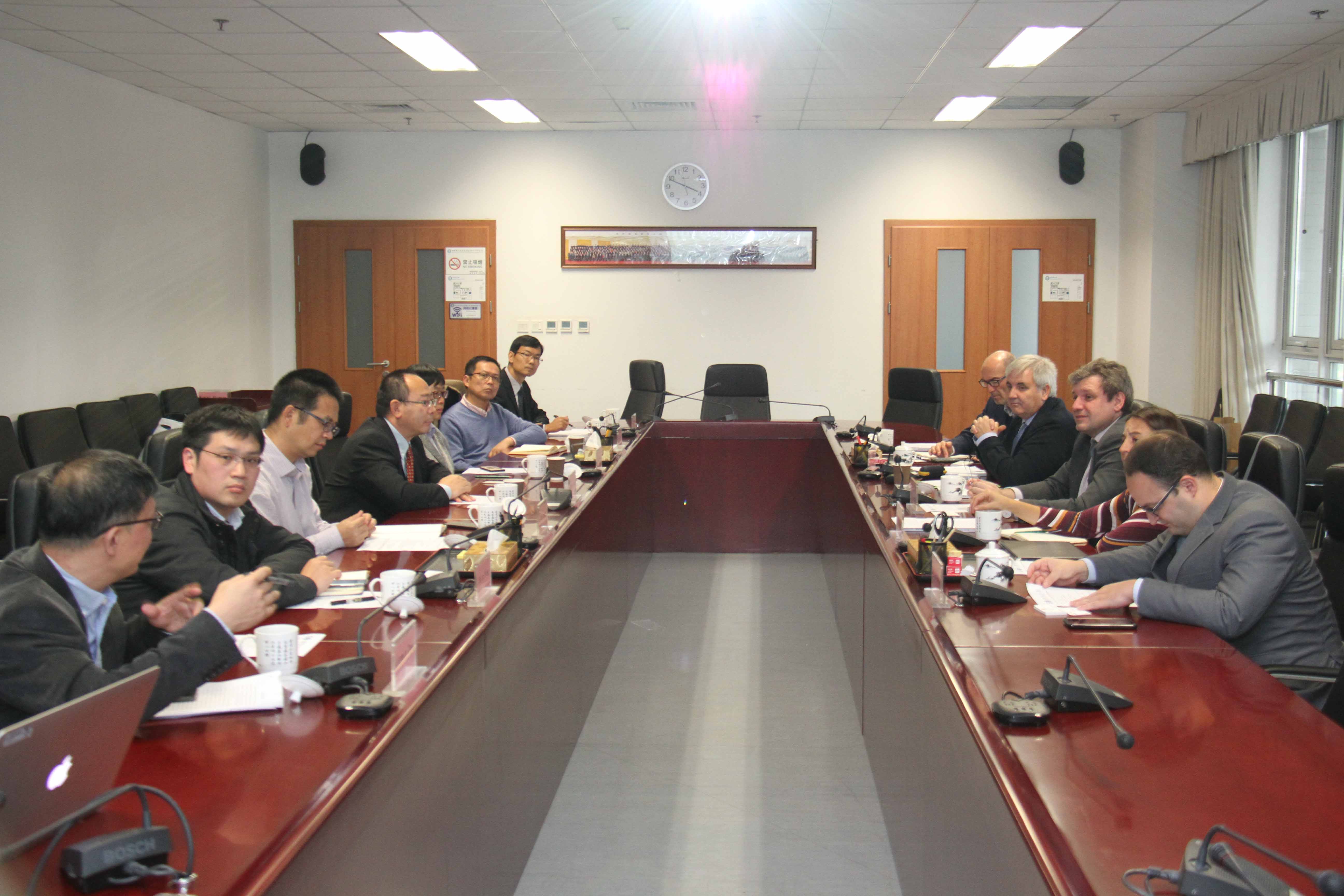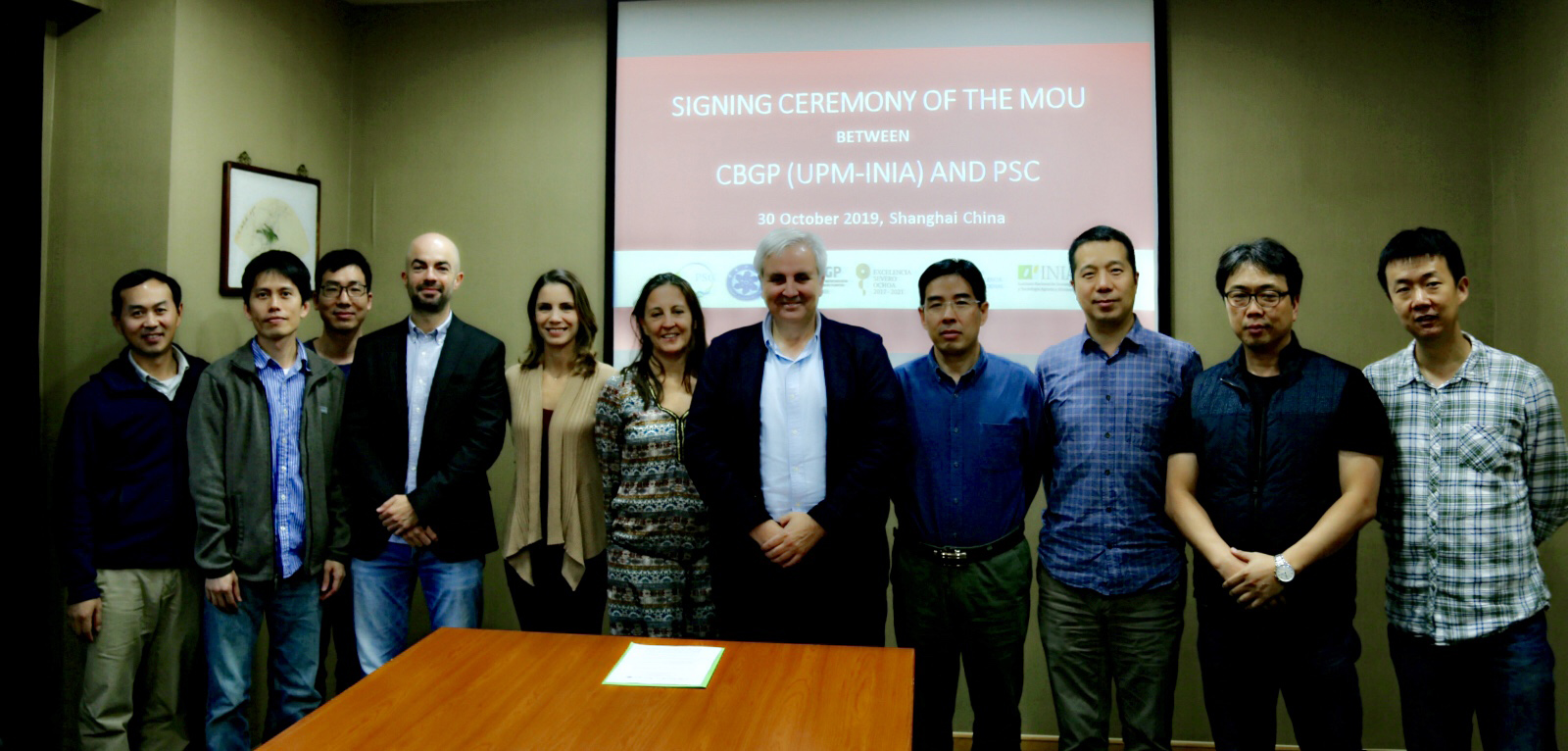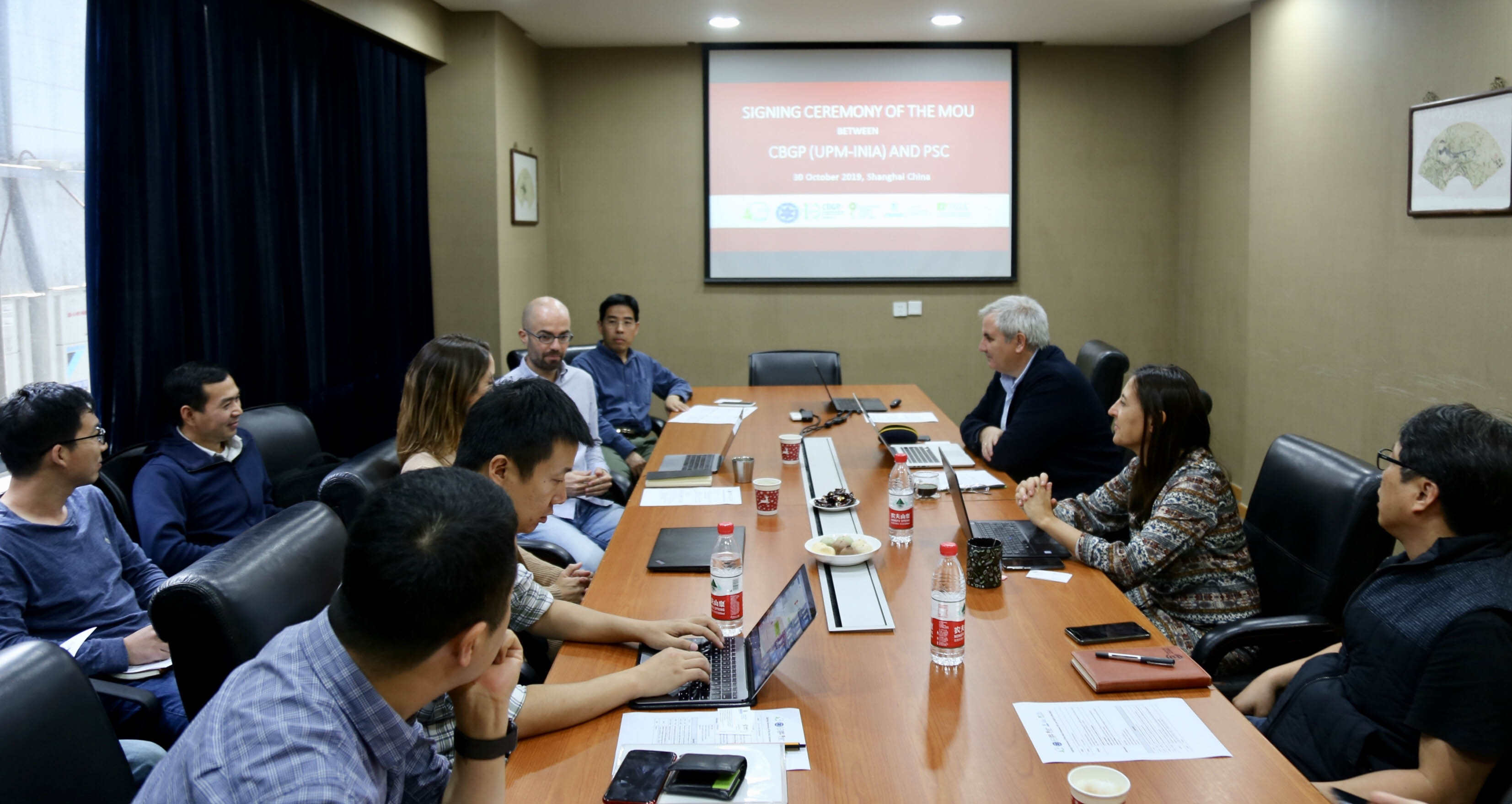This new International centre will bring together three world-leading plants research institutes to tackle the global challenge of producing enough food for the world population by generating science of excellence and developing technologies for a sustainable agriculture.
The Centro de Biotecnología y Genómica de Plantas (CBGP, UPM-INIA), a joint research centre of the Spanish Universidad Politécnica de Madrid (UPM) and the Instituto Nacional de Investigación y Tecnología Agraria y Alimentaria (INIA), has signed in Beijing and Shanghai (China) a Memorandum of Understanding (MoU) with the Institute of Genetics and Developmental Biology (IGDB) and the Shanghai Centre for Plant Stress Biology (PSC) to establish a joint international research Centre of Excellence in Plant-Environment Interactions (CEPEI). IGDB and PSC are two world-leading plants research institutes from the Chinese Academic of Science (CAS) and the CBGP (UPM-INIA) holds the accreditation of Centre of Excellence Severo Ochoa (SO) from the Spanish Research Agency.
The MoU aims to reinforce the international position of the CBGP (UPM-INIA), that is one of the objectives of the Severo Ochoa strategic plan. This Spanish-Chinese collaboration represents a unique opportunity to develop ambitious scientific and technological programs aiming to reach the global mission of developing a more sustainable agriculture that will provide enough and healthy food for the world population. To reach this goal it is mandatory to deeply understand the regulatory mechanism and genetic plasticity involved in plants/crops nutrition and adaptation to environmental stresses, of particular relevance in a scenario of climate emergency. By putting together key researchers from these three prestigious institutions and by allocating additional R&D resources to this initiate, they expect to generate frontiers knowledge and to develop novel technologies for improving crops nutrition and adaptation to environmental stresses, which are highly demanded by the agriculture sector. The new international centre of excellence will maximise the synergies between IGDB, PSC and CBGP (UPM-INIA).
In the words of the CBGP Director, Antonio Molina, ´for the CBGP and our founder institutions (UPM and INIA) is an honour to collaborate with these two prestigious Chinese research institutions. This collaboration will impulse CBGP international position and will allow us to initiate ambitious, interdisciplinary projects with two of the best world-leading plant research institutes. To carry out these projects, we will incorporate new researchers supported by our SO grant and by Chinese research funds´. Dr. Molina also declared that ´this international collaboration will improve the quality and impact of our scientific contributions and technological innovations and should strength the R&D cooperation between China and Europe in the agriculture field”. The Vice president of International Affairs of the UPM, Jose Miguel Atienza, declared that “this agreement of the CBGP with IGDB and PSC will reinforce the strategic position of the UPM in China, and will open new opportunities for training and R&D collaborations in areas like Biotechnology, Agriculture and Forestry, in which our university is a world reference“. For Esther Esteban, INIA Director, “this agreement will be the starting point for other collaborations of INIA with China in scientific fields of the outmost importance for our country such as livestock diseases, environmental impact of new materials and forest management and ecology”.
In the words of the IGDB Director, Weicai Yang “the collaboration with CBGP further extends our (IGDB) partnership with leading international institutions in the areas of plant stress adaptation and nutrition. This will allow both institutions to better tackle new frontiers by joint efforts. We will assign existing and new PIs in the relevant areas to this new joint centre of excellence and are looking forward to productive and impactful collaborations for years to come“. The Vice Director of PSC, Yuehui He, declares that “we believe that sharing our experience and working together could be of great value to both PSC and CBGP, as both institutions strive for excellence in the development of plant science and technology. We are sure that our faculty and students will benefit greatly from this long-term collaboration.”
The three research institutes have already established a coordination team to execute the next initiatives of this international research centre that will include the establishment of a management structure, a first call on 2019 for collaborative projects and the organisation (February 2020) at CBGP facilities of the first join Workshop on “New Frontiers in Plant-Environment Interactions”, that is expected to count with the participation of more than 12 prestigious researchers from IGDB and PSC.
About Centro de Biotecnología y Genómica de Plantas (CBGP, UPM-INIA)
The Centro de Biotecnología y Genómica de Plantas (CBGP) is a joint research centre of the Universidad Politécnica de Madrid (UPM) and the Instituto Nacional de Investigación y Tecnología Agraria y Alimentaria (INIA). The CBGP (UPM-INIA) holds the recognition of centre of Excellence Severo Ochoa. The strategic objectives of CBGP (UPM-INIA) are the generation of fundamental knowledge on the genetic and molecular bases of key biological and physiological processes in plants and plant-interacting organisms, and on genomics of plants and plant-interacting organisms. The Centre also aims to develop new Computational Biology technologies for the functional analysis of plants/microorganisms. CBGP researchers are grouped into four Research Areas/Themes: Plant Development (8 groups); Interactions of Plants with Environment (8 groups), Biotechnology (4 groups) and Computational/systems Biology and Genomics Program (CsBGP, 5 groups). CBGP has attracted talented scientists since its foundation, including 15 Tenure-track positions and 3 ERC Starting Grants. The centre has a remarkable Translational Biology activity within the innovation ecosystem of the International Campus of Excellence of Montegancedo-UPM, that has resulted in the creation of four CBGP based spin-off enterprises and in the development of new products/processes for the bioeconomy sectors.
About IGDB
The Institute of Genetics and Developmental Biology (IGDB) of the Chinese Academy of Sciences (CAS) was founded in 2001, through a merger of three institutes: the Institute of Genetics, the Institute of Developmental Biology, and the Shijiazhuang Institute of Agricultural Modernization. The merger has created a modern, thriving Chinese institution of scientific research, with about 90 principal investigators and more than 360 researchers and technical staff. IGDB uses research on plant and animal models to help solve relevant challenges in China, such as those of food security and human health, or crippling water shortages for its vast population of more than one billion people. The institute has five research centers in the fields of genome biology, molecular agrobiology, developmental biology, molecular systems biology and agro-resources, respectively. The institute also homes to three state key laboratories including the State Key Laboratory of Plant Genomics, the State Key Laboratory of Plant Cell and Chromosome Engineering, and the State Key Laboratory of Molecular Developmental Biology. Researchers in the institute have achieved breakthroughs in crop genomics, wide hybridization, molecular breeding, and regenerative medicine. It also has relationships with institutes and universities around the world to tackle the global challenges of food security and sustainable healthcare. Together with 10 other CAS institutes, in 2018 IGDB established the College of Advanced Agricultural Sciences at the University of CAS and has also been working on the establishment of the Innovative Academy for Seed Design (INASEED) of CAS, which includes members from 19 other institutes of CAS, to support the national seed industry.
About PSC
The Shanghai Center for Plant Stress Biology (PSC) was created in 2012 as a research unit of the Chinese Academy of Sciences (CAS), with funding from CAS. With 16 principal investigators and more than 250 researchers and staff members, PSC aims to become an international leading center for plant research, focusing on the study on plant responses to environmental stresses, plant nutrition, epigenetics, and genome editing. It fosters innovative, vibrant, and interactive research groups synergized by a battery of state-of-the-art core facilities, including genomics, metabolomics, proteomics, microscopy and transformation facilities. PSC strives to develop fundamental and applied knowledge to achieve sustainable solutions to protect plants from environmental challenges.
About the SO and MM Excellence Program
Spain has 25 Centres of Excellence Severo Ochoa and 23 Units of Excellence María de Maeztu, that were selected on the bases of their scientific performance over the last five years and of their strategic plans, after a rigorous evaluation by international scientific committees grouped in three areas: life sciences and medicine; experimental sciences, mathematics and engineering; and human and social sciences. The goal of this initiative is to improve the international impact of Spanish research by awarding grants to R+D+i centres and units that stand out for the relevance and global impact of their research results, thus contributing to improve their international strategic position.
About the UPM-Asia cooperation program
The UPM-Asia cooperation program, that was initiated on 2000 and consolidated on 2005, is based in four pillars: i) to establish collaborations agreement in training, research and development and innovation with the best universities / institutions in Asia; ii) to focus these relationships with a long-term objective developing joint programs and joint research activities; iii) to establish collaboration based in mutual trust and commitment; and iv) to identify shared interests and opportunities. To impulse these ambitious objectives the UPM has a permanent office in Shanghai (China) lead by the UPM-Asia Director Dr. Claudio Feijoo. This office has a very active role in the establishment and management of agreements (more than 30 currently) with prestigious Chinese institutions/universities, to which the IGDB-CAS (Beijing) and PSC-CAS (Shanghai) will be added.






